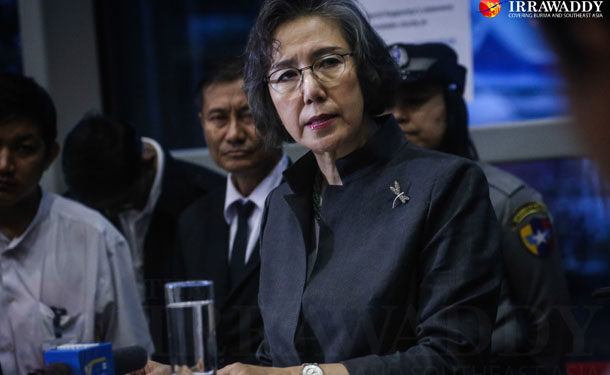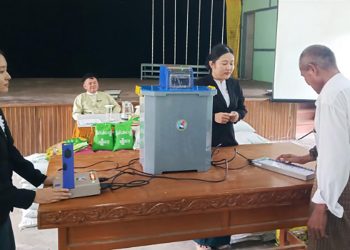RANGOON — A senior Burmese government official has pushed back against a statement from the United Nations on Monday, in which its human rights envoy to Burma warned that the country risked backtracking on political reforms and urged the government to allow more freedom to journalists and activists.
“We do not agree the notion of the Special Rapporteur [Yanghee Lee] that democratic space is shrinking as we are of the view that the challenges we are facing today in the area of media and civil society space include striking a balance between rights and responsibilities together with ethnical [sic] reporting and professionalism,” read a statement posted to the Facebook account of Hmuu Zaw on Tuesday and attributed to a senior official from the President’s Office.
The Facebook account of Hmuu Zaw is widely known to be operated by President’s Office Director Zaw Htay.
The statement went on to defend the recent sentencing of five staff members of the Unity journal to 10 years’ imprisonment with hard labor, claiming that the defendants had received a fair trial and insisting that they were put on trial not for merely reporting, but rather for revealing state secrets and on a separate trespassing charge.
Regarding Lee’s accusations of dire human rights violations in Arakan State, which she visited last week, the President’s Office official both commended and admonished the new UN envoy.
“We welcome the facts that Ms. Yanghee Lee acknowledged the concerns of the Rakhine [Arakanese] community which was consistently ignored by the previous Special Rapporteur [Tomás Ojea Quintana].
“We encourage Ms. Yanghee Lee to deepen her study to better understand the background and history of this delicate issue,” he said, referring to long-running tensions between Arakan State’s majority Arakanese Buddhists and Rohingya Muslims.
The President’s Office official went on to urge against use of the term Rohingya, which the government does not recognize. Naypyidaw and much of the Arakanese Buddhist community instead calls those who identify as Rohingya “Bengalis,” implying that they are illegal immigrants from Bangladesh.
“[W]e do not accept the term ‘Rohingya’ which has never existed in the country’s history. … The term has been maliciously used by a group of people with wider political agenda. The people of Myanmar will never recognize the term,” he said.
The UN envoy, who made her first trip to Burma from July 16-26, has said her use of the term is in keeping with the human rights principle of allowing the minority group to self-identify.
Lee on Monday noted positive developments in Burma since President Thein Sein took power in 2011, but also sounded a note of caution.
“In three years, Myanmar has come a long way since the establishment of the new Government. This must be recognized and applauded,” she said. “Yet, there are worrying signs of possible backtracking which if unchecked could undermine Myanmar’s efforts to become a responsible member of the international community that respects and protects human rights.”
Those signs, according to Lee, included an increasingly intolerant approach to journalists in Burma and civil society activists.
“These patterns not only undermine the work of civil society and the media, but also impose a climate of fear and intimidation to the society at large,” the special rapporteur said.
“The enjoyment of the rights to freedom of expression and freedom of association and peaceful assembly are essential ingredients for Myanmar’s democracy, particularly in the run-up to the 2015 elections,” she stated. “There should be strict and clear safeguards to prevent undue interference in public freedoms.”

















